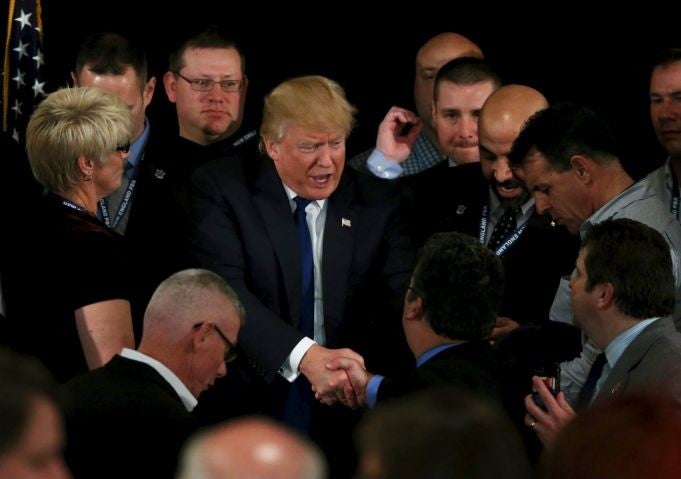Take care when using a term like ‘fascist’ – even for Donald Trump
Labels of the past century may blind us to new brands of hostile nationalism


Your support helps us to tell the story
From reproductive rights to climate change to Big Tech, The Independent is on the ground when the story is developing. Whether it's investigating the financials of Elon Musk's pro-Trump PAC or producing our latest documentary, 'The A Word', which shines a light on the American women fighting for reproductive rights, we know how important it is to parse out the facts from the messaging.
At such a critical moment in US history, we need reporters on the ground. Your donation allows us to keep sending journalists to speak to both sides of the story.
The Independent is trusted by Americans across the entire political spectrum. And unlike many other quality news outlets, we choose not to lock Americans out of our reporting and analysis with paywalls. We believe quality journalism should be available to everyone, paid for by those who can afford it.
Your support makes all the difference.As every good GCSE student knows, the term fascist derives from the use by political groups of various stripes in 19th-century Italy of the word fasci – literally “bundle” but figuratively “union” or “league”. It was not initially associated with nationalism or the extreme right; but became so when Mussolini adopted the term for his Fascist Party after the First World War. The link to the ancient Roman symbol of power, the fasces lictoriae, was a helpful tie to a great past – and indicative of the opposition to modernity which came to characterise the various fascist regimes which developed in the 1920s and 30s.
Why the history lesson. I hear you ask? In the past week. the word “fascist” has been bandied about quite widely in connection with two very different phenomena: first, the regional electoral success (whatever the outcome of yesterday’s second round) of the Front National (FN) in France; and second, the phenomenally strange Donald Trump. It is an easy description for any seemingly extreme right-wing political group or idea – making for sensational front pages.
But when a term is so loaded, it can easily be over-used. There is also the danger that those who support parties like the FN or politicians like Trump will have a modicum of a point when they say that opponents are being reductionist or hysterical in their criticisms.
This is the problem with a word like “fascist”: it is too simplistic, even though it is not necessarily inaccurate. After all, Marine Le Pen’s party explicitly favours the rights of French citizens over those of immigrants in a way that is redolent of the kind of virulent, aggressive nationalism which the European Union was established to discourage. No wonder the FN is anti-EU.
Similarly, Trump’s call to ban Muslims from the United States would hardly have seemed out of place had it come from the mouth of a 20th-century dictator. Yet it isn’t good enough for those of a progressive bent simply to cry “fascist” and expect everyone to jump up and down as if it’s still 1938.
The FN and Trump have risen from different sets of circumstances – distinct from one another and certainly from historical predecessors. The labels of the past century may, if we aren’t careful, blind us to the very 21st-century reasons for the emergence of a new brand of hostile nationalism – and perhaps prevent the development of a cogent, liberal response.
No cloak of invisibility
A recent lecture held by Goldsmith University’s Atheist, Secularist and Humanist Society was interrupted by protesters from the university’s Islamic Society, who were unhappy at the views being expressed by the speaker, Maryam Namazie.
The talk – and the interruption – were filmed and uploaded to YouTube. The video was subsequently embedded in a report on The Independent’s website, leading to a complaint from a person it featured. They felt their privacy had been invaded.
In principle, I can see that a student lecture theatre could be a place where attendees have a reasonable expectation of privacy. But on this occasion the lecture had been open to the public. Moreover, in light of the dispute which had arisen there was surely a public interest in showing what had actually taken place.
Student politics may not have the global significance of the race for the Republican Party’s presidential nomination, but that doesn’t mean it is deserving of a cloak – or toupée – of privacy.
Join our commenting forum
Join thought-provoking conversations, follow other Independent readers and see their replies
Comments